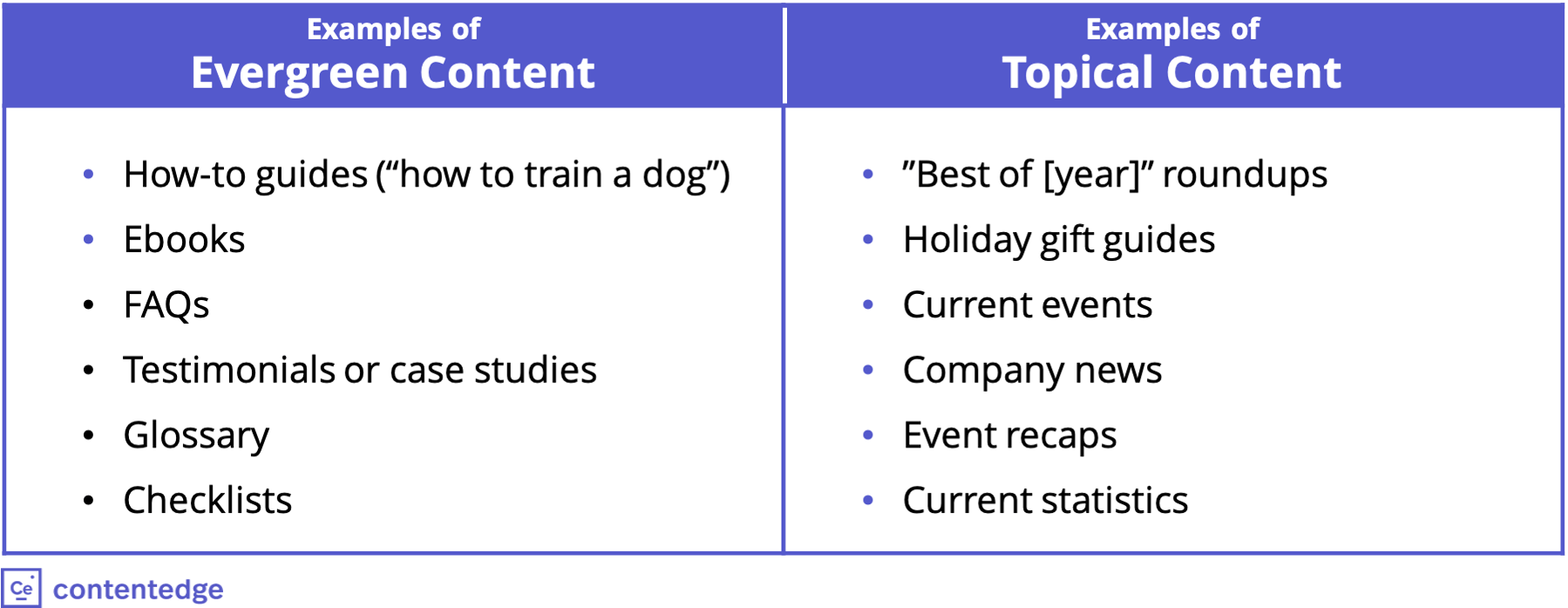If you’ve been in content marketing for a while, then you know that marketers tend to have hot takes when it comes to evergreen vs. topical content.
Some will say that you need to publish both. Others will say that one is more effective than the other. Our answer: it depends.
At minimum, you should understand the distinction between evergreen vs. topical content and how they contribute to your marketing goals. From there, you should consider a variety of factors to decide which one(s) to include in your content calendar.
Some questions to ask yourself: How much time do you have to create fresh content? What do you want out of your content strategy? Who are you writing for?
Keep reading for more specific tips on how to weigh your options, and how each plays a role in your organic rankings.
Back to basics

What is topical content?
Topical content (aka, timely or seasonal content) is time-sensitive and relevant to a current event or trend. For example, you could create a holiday gift guide that’s only relevant for several months out of the year. Or, back when the COVID-19 pandemic broke out, you might’ve released articles offering the latest stats and info related to the virus. The latter is also referred to as “newsjacking” and, like topical content, has an obvious expiration date.
What is evergreen content?
Evergreen content, by contrast, doesn’t have a clear expiration date. In theory, evergreen content can stay relevant forever (though in practice, it usually needs refreshing to keep its ranking and remain effective). For example, how-to articles generally fall in this category because the information holds its value and accuracy over time. It gets its name from the evergreen family of trees, which retains its leaves year round.
Evergreen vs. Topical Content: A Quick Comparison
Longevity
Topical content is fleeting and intended to bring a spike in traffic upfront when interest is highest. It is usually season-based, event-based, or news-based. And to maximize ROI, marketers will often publish their content at least several weeks before a planned event, while interest is still ramping up. Topical content typically requires active promotion to maximize its benefits and to stand out from the crowd while people are actively searching for it.
Evergreen content is intended to accumulate traffic over a long period of time. When you create evergreen content, you bank on the fact that people will continue to seek out information on this topic for many years to come. So, rather than getting tons of traffic at once, you’re earning consistent traffic throughout multiple seasons. To maximize your ROI, you’ll want to promote your content regularly because even though interest may not die down, other competitors may swoop in and build their authority around your topic.
Organic volume
Topical content tends to be highly searchable, attracting hordes of people who are researching the topic at the same time. This may be because of a news headline, marketing campaign, or social trend that broke out. Think: #momsoftiktok or #freebritney. Millions of people engaged with content around these topics in 2021, but have since moved on to other campaigns and trends.
Evergreen content can also be highly searchable, but the traffic doesn’t usually fluctuate as dramatically as topical content does. By contrast, traffic is more consistent month over month. Interest can build as your domain increases its authority, or as your content ranks for more related terms over time.
Organic competition
Topical content usually attracts lots of competition because of the publicity it generates. It’s possible to sidestep competition by targeting long-tail keywords, but some topics may not have a deep keyword history, making it harder to discern which keywords will be easier to rank on. For instance, say that a new tech discovery comes out. You fire up your keyword research tool, only to discover that there is little to no relevant data in there because the general public has never googled (let alone heard of) the tech before. In this instance, you’ll have to trust your gut and publish content on what you believe will be trending in the months to come.
Evergreen content is not necessarily less competitive than topical content, but may lend to a greater variety of long-tail keywords to choose from. This is because many evergreen topics have already been around for a while and have had time to amass a larger, more diverse audience. Your job, then, is to decide which keywords are more relevant to your audience in regards to the topic. For example, rather than targeting a broad term like “best coffee,” you may target, “best coffee for cold brew lovers.”
Brand perception
Topical content can be used to demonstrate your brand’s credibility. It can serve as proof that your brand is up to date with the latest news and trends related to your industry, plus earn you backlinks from publications that are looking to cite the most recent information on trending stories. Similar to a newsroom, topical content tends to work best when you’re one of the first to report new information and/or can provide a fresh perspective on a much-talked-about topic.
Evergreen content can also build up your brand authority, but is usually achieved by providing in-depth analyses, thought leadership, or guides that can be referenced at any time. You may build a large repertoire of content that demonstrates your depth and breadth of knowledge and become a go-to source for all things related to your expertise.
Maintenance
Topical content, as expected, requires regular publishing. Because content only remains fresh for so long, you’ll need to consistently refresh or create new content to continue bringing people back to your site. Not to mention that you’ll need to devote time to promoting your published pieces so that you can make the most out of the limited time that they’re relevant for.
Evergreen content doesn’t have to be replaced as frequently. Rather, it should be updated as new information comes up. With evergreen content, there is a greater emphasis on organic performance and rankings because of its longevity, and so you should always look for opportunities to optimize it.
The final verdict: do you need to offer both?
This may be an unpopular opinion, but we’d argue no.
While both topical and evergreen content are valuable, many smaller teams may choose to strictly focus on evergreen content because it has a longer shelf life and greater SEO value. Content creation can be a time-consuming process, so if a team is very limited in time or resources, the long-lasting benefits of evergreen content can be very attractive.
On the other hand, some businesses may deem topical content a better strategy if they’re part of a fast-changing industry and/or can pump out unique data and insights quickly. You wouldn’t be chasing long-term organic rankings as much as you’d be looking for immediate publicity, aiming to gain more backlinks and PR.
With all that said, evergreen content and topical content can play nicely with each other. You could publish a topical piece, for instance, and then follow up with a more evergreen commentary that approaches the same topic from a different angle.
The main things you’ll want to ask yourself are, what does your audience care about? Where do they get their information? Are there a lot of keyword opportunities that warrant an evergreen strategy? Or, conversely, do you need to focus more on PR and reaching your audience through other avenues outside of a google search? Once you’ve answered these, you can narrow down your strategy to topics and content types that help you to connect with your audience.
In conclusion
Our number one advice: don’t get hung up on including both evergreen and topical pieces into your calendar just because other marketers say so. Decide which type of content actually matters to your target reader most and delivers the most ROI for your time.
